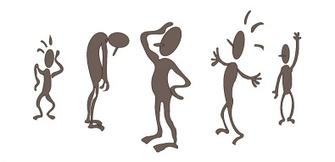Body language gives away tendencies...
So far we've heard from Aspen Kern and Prem Carnot on the topic of getting clues from your opponent. A topic like this would be incomplete without the thoughts of Sarah Anboury. She has an article with the RV Picklers called 3 Keys to Look For: Watching Your Opponent from which the following excerpts are taken.
Keep Your Head Up
A big reason people struggle to see what is in front of them is their posture. Often players dip their heads. If you are bobbing up and down, often because of excess movement, it is difficult to see the court in front of you. So my first piece of advice is to keep your chest and your head up. We want to look at our opponents, determine what they are doing and when it is best to attack. Here are some keys to look for:
#1 – Watch the Tip of Their Paddle
Often the tip of their paddle tells you what they are anticipating. It is very common for players to have their paddle tip angled to their backhand. If so, this tells you picking on their forehand could be a very good option. Most likely when they go for a forehand it will be behind them causing them to back up or hit the ball high to attack.
Or you might notice that the tip of their paddle is pointing to the ground. In this case, attacking up at their shoulders is good because they won’t have time to get to it...
#2 – Watch Their Hips
Often their hips will tell you where they are wanting to direct the ball or what they are prepared for. Especially if they have their hips aligned with their feet often you can find them angled say cross court slightly back from the line. Any ball you hit on the other side of their bodies will be behind them and again difficult for them to get...
#3 – Watch Their Toes
Watching your opponents feet and toes tells you how balanced a player is. Often you see a player’s toes up and heels down…meaning their weight is moving backward. “Falling back” will often create a high ball that you can attack. If you can see a player’s toes moving around in their shoes this is a clear sign they are off-balance. When your opponent is off-balance this is the ideal time to attack them and not give them a chance to rebalance.
Now we have three expert's thoughts on the topic, with some different opinions. I would like to wrap this up with my own thoughts...but I can't do that yet. Next week, I want to talk about deception and misdirection. That discussion has an impact on my conclusion.
Keep Your Head Up
A big reason people struggle to see what is in front of them is their posture. Often players dip their heads. If you are bobbing up and down, often because of excess movement, it is difficult to see the court in front of you. So my first piece of advice is to keep your chest and your head up. We want to look at our opponents, determine what they are doing and when it is best to attack. Here are some keys to look for:
#1 – Watch the Tip of Their Paddle
Often the tip of their paddle tells you what they are anticipating. It is very common for players to have their paddle tip angled to their backhand. If so, this tells you picking on their forehand could be a very good option. Most likely when they go for a forehand it will be behind them causing them to back up or hit the ball high to attack.
Or you might notice that the tip of their paddle is pointing to the ground. In this case, attacking up at their shoulders is good because they won’t have time to get to it...
#2 – Watch Their Hips
Often their hips will tell you where they are wanting to direct the ball or what they are prepared for. Especially if they have their hips aligned with their feet often you can find them angled say cross court slightly back from the line. Any ball you hit on the other side of their bodies will be behind them and again difficult for them to get...
#3 – Watch Their Toes
Watching your opponents feet and toes tells you how balanced a player is. Often you see a player’s toes up and heels down…meaning their weight is moving backward. “Falling back” will often create a high ball that you can attack. If you can see a player’s toes moving around in their shoes this is a clear sign they are off-balance. When your opponent is off-balance this is the ideal time to attack them and not give them a chance to rebalance.
Now we have three expert's thoughts on the topic, with some different opinions. I would like to wrap this up with my own thoughts...but I can't do that yet. Next week, I want to talk about deception and misdirection. That discussion has an impact on my conclusion.




No comments:
Post a Comment